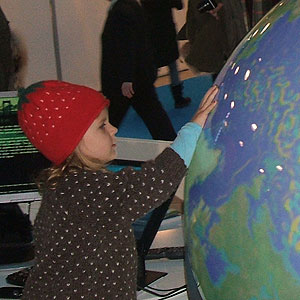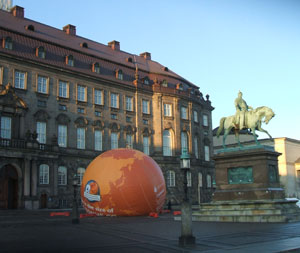December 13, 2009
√òrestad, Copenhagen
 |
This past weekend I spent most of my time at , the largest side-event to the .¬ÝI did this with some ambivalence.¬ÝI don‚Äôt come from a background in industry or engineering or science or business, and as a result, I have never approached environmental issues as ‚Äúopportunities‚Äù for innovation or commercialization. To my mind if I‚Äôm in Copenhagen I‚Äôm supposed to be downtown with the protestors (though not the ones who are throwing rocks ‚Äì I don‚Äôt think that‚Äôs terribly productive) or at least mingling with the thousands and thousands of COP delegates, even though they‚Äôve now instituted a quota which dramatically limits the number of people who will be able to get into the Bella Center.¬Ý
So initially I actually felt guilty at being at Bright Green, which is essentially an industrial trade show, because it felt ‚Äì well, opportunistic.¬ÝA case in point: one speaker pointed out that for the global South, sustainability is not a luxury; sustainable practices are ‚Äúthe path to affluence.‚Äù¬ÝGreat, I thought. Then he added, ‚ÄúAnd there‚Äôs a lot of money to be made there.‚Äù¬ÝAnd I winced.¬Ý
And yet, there are three things that reconciled me to spending this weekend this way. One, this is where ∫⁄¡œ≥‘πœÕ¯wants me to be, and where, frankly, people want to hear about our College of Sustainability.¬ÝTalking to people about actual change feels like a more constructive way to spend the day than lamenting a lack of change in political positions. We had several meetings, mostly with other academics (, the University of Copenhagen, Aarhus University ‚Äì where we were filmed!) to talk about setting up exchanges of students and faculty.¬ÝSo, for example, Dal students could take a semester studying wind technology here, and European students could take a semester studying tidal or marine-powered technology, or a background in sustainability issues, in Halifax.¬Ý¬Ý
 |
| At the Bright Green conference. (Claire Campbell Photo) |
Two, we‚Äôre often told that it‚Äôs political will which must drive environmental change ‚Äì and indeed, Denmark is an example of that: its clean energy turn has been the result of state funding and regulation since the 1970s. A Swede we met from a research laboratory called it ‚ÄúDenmark‚Äôs industrial fairytale.‚Äù¬ÝBut the other reality is that a political commitment rests on the promise of economic growth ‚Äì no politician will campaign otherwise ‚Äì and for that you need industrial buy-in.¬ÝIn September Denmark inaugurated the world‚Äôs largest off-shore wind farm in the North Sea, and leads the EU ‚Äì and much of the world ‚Äì in exporting wind power technology. (We met with Vestas to see if we could install a demonstration turbine at Dal).¬ÝBright Green emphasizes there are billions of dollars ‚Äì and hundreds of thousands of jobs ‚Äì to be created in this.¬ÝAnd I teach a lot of students who want precisely that.¬Ý¬Ý
Besides, conservation was valued long in its economic sense long before it was associated with climate change. I think of my grandmother, who was a single mother and who grew up in the Depression.¬ÝYou know the type:¬Ýshe gave us socks for Christmas, and never threw anything away.¬ÝShe had a tiny ‚Äúcarbon footprint,‚Äù simply because she was frugal. You turn the lights off when you leave the room, not because of greenhouse gasses, but because you save money.¬ÝAnd people who might not yet be on board with the environmental cause might be convinced by the financial bottom-line.
 |
| At Christianborg Palace. (Claire Campbell Photo) |
And three, while it‚Äôs easy to panic when you see footage about the tar sands, or the Antarctic shelf, it is amazingly heartening to see the hundreds of projects that have made better environmental practices commercially viable.¬ÝIt‚Äôs inspiring ‚Äì especially for someone who‚Äôs not from a technical or scientific background - to see all the neat things people can dream up.
Still, while COP 15 spawns many parallels events, I think they should swap audiences.¬ÝYouth should see the ‚Äúpositive‚Äù spin at Bright Green, and business should see the concerns at .
Do I sound like The Establishment?¬Ý I hope not.¬ÝThen again, what if The Establishment was full of people who thought this way?
The government of Canada hosted a seminar which, and I can‚Äôt decide if this is more of a telling statement about our multi-level political system and resultant national unity issues, or a strategic avoidance to , consisted of presentations from Ontario, Nova Scotia, and the city of Calgary.¬ÝHere ambivalence reared its head again.¬Ý Calgary, Alberta ‚Äì but which has some of the country‚Äôs best potential for wind and solar energy, and is the secretariat for the World Energy Cities. Nova Scotia, which still gets the vast majority of its energy from coal-fired (imported coal, to boot) plants¬Ý‚Äì but which just dropped its first into the Bay of Fundy to harness energy from the world‚Äôs highest tides.¬ÝStill, we need a greater demand in Nova Scotia to reshape the energy grid to allow for other energy sources, and we need more enthusiasm in government for this kind of change.
Some other interesting events and notes from the weekend:
- An opening panel with the Crown Princes of Denmark and Norway and the Crown Princess of Sweden, who recently toured Greenland to see the effects of climate change.
- The U.S. Secretary of Energy reminded us (as Americans are wont to do) that the United States is the world’s largest producer of wind and biomass power. I’m going to romanticize Denmark, of course, but the fact is that it’s countries like the U.S. who have the power of scale.
- In September 2010, Katherine Richardson (U of Copenhagen) and a team of scientists will provide the government of Denmark with a strategy on how to eliminate the use of fossil fuels by 2020!
- Danish architectural and landscape design – historical and modern – is stunning.
- My hotel looks like the United Nations, and that’s kind of neat.
So, I‚Äôm still ambivalent.¬ÝBut teachers know that you usually get better results from encouragement than from criticism, especially when someone wants to go in that direction.¬Ý Students want careers that add to the quality of life for us and the planet.¬Ý¬ÝThese are possible.¬ÝAnd that gives me hope.
Off to Aarhus for two days.¬Ý
